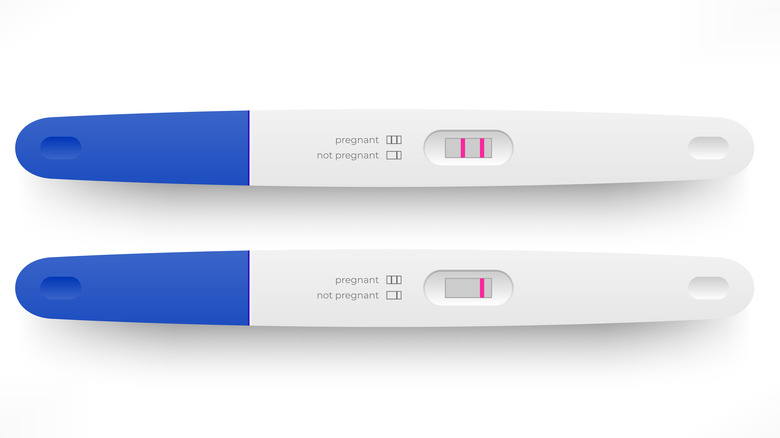A Doctor Explains Why False Positives Show Up On Pregnancy Tests And What They Could Mean
Pregnancy tests work by detecting human chorionic gonadotropin (HCG) — a hormone produced during implantation as the placenta begins to develop (via Mayo Clinic). Producing either a positive or negative test result, users rely on pregnancy tests to deliver prompt and accurate results. In rare cases, however, a pregnancy test may produce an inaccurate reading. In an exclusive interview with Health Digest, Mary Jane Minkin, M.D., OB-GYN, clinical professor of obstetrics, gynecology, and reproductive sciences at Yale University School of Medicine, and founder of MadameOvary.com, explains under what circumstances a pregnancy test may yield a false positive test result.
"Not all pregnancy tests are the same; some are more accurate than others, and some detect pregnancy earlier than others," Dr. Minkin starts off by explaining. "The test that tells you the earliest — as early as 6 days before the first day of your expected period — is the First Response Early Result pregnancy test." Dr. Minkin goes on to state that First Response also offers an app that interprets the faint lines seen on their pregnancy tests to definitively read either "pregnant" or "not pregnant." "With some other kits," she says, "you may see a faint line if they are just earlier than one can definitively detect with their kit."
The importance of taking a second test
So what else might cause a pregnancy test to inaccurately display faint lines? "The other possibility is that in [people] who have miscarried, the hormone that is made during the pregnancy that tells you that you are pregnant (HCG) goes down slowly (it doesn't disappear immediately)," Dr. Minkin tells Health Digest. "So it will often stay positive for two weeks or even more after the miscarriage occurs — and so you could still see a faint line," she explains. Similarly, the Mayo Clinic reports that certain HCG-containing fertility medications may also influence a false positive reading. However, such medications do not include birth control.
To help ensure that the results you're seeing on your pregnancy test are accurate, Dr. Minkin encourages the use of a second test. "Depending on the test, you occasionally will just see a false positive — so repeating the test in a few days would be ideal. And, of course, one can always do a blood test as a backup test," she concludes.


